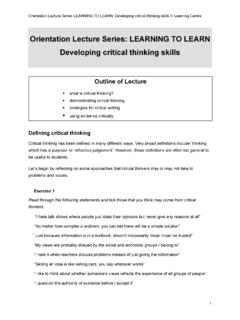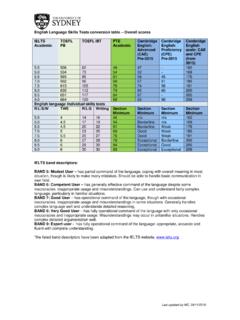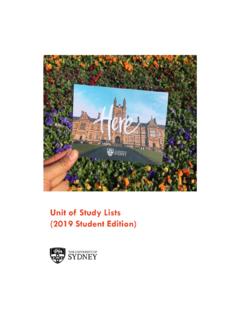Transcription of Mind the Gap: The National Disability Insurance …
1 Mind the Gap: The National Disability Insurance Scheme and psychosocial Disability Final Report: Stakeholder identified gaps and solutions January 30th, 2018 Mind the Gap: the NDIS and psychosocial Disability . Page | 2 Project Team The University of Sydney Associate Professor Jennifer Smith-Merry Dr Nicola Hancock Dr John Gilroy Professor Gwynnyth Llewellyn Ms Ivy Yen Community Project Partner Amanda Bresnan, Community Mental Health Australia (CMHA) Funder: The University of Sydney Policy Lab Contributing Stakeholder Organisations and Programs ACT Health (Brian Hennessy Rehabilitation Centre) Advanced Diversity Services Aftercare PIR West Moreton-Oxley Anglicare WA ARAFMI Queensland Breakthru Carers NSW Catholic Care NT Centacare North Queensland Central Coast Primary Care Challenge Community Services Clarity Psychology Chorus Clearwater (Me Well Australian Disability Enterprise) Flourish Gugan Gulwan Youth Aboriginal Corporation HelpingMinds Lamp Inc.
2 Laynhapuy Homelands Aboriginal Corporation Life Without Barriers Mental Health Consumer Coalition ACT Mental Illness Fellowship of Western Australia MHCC (Mental Health Coordinating Council) NSW MHCCACT (Mental Health Community Coalition ACT Inc.) Micah Projects Mind Australia Limited Mind Works Miwatj Health Aboriginal Corporation NDS NT ( National Disability Services) NEAMI National New Horizons NMHCCF ( National Mental Health Consumer and Carer Forum) NT Mental Health Coalition NWRH (North and West Remote Health) Office of the Public Advocate QLD One Door Mental Health Queensland Alliance for Mental Health Inc. RFQ (Richmond Fellowship Queensland) Ruah Community Services Salvo Connect Barwon Selectability Sisters Inside Inc. St Laurence Karingal St Vincent De Paul Family and Youth Homelessness and NDIS Mental Health Services Tandem The Benevolent Society Toowoomba Clubhouse Uniting Recovery VACCHO (Victorian Aboriginal Community Controlled Health Organisation Inc.)
3 VICSERV (Psychiatric Disability Services of Victoria) VMIAC (Victorian Mental Illness Awareness Council) WAAMH (Western Australia Association for Mental Health) Warrina Services Wellways Yellow Bridge QLD Mind the Gap: the NDIS and psychosocial Disability . Page | 3 Contents Project Team .. 2 Contributing Stakeholder Organisations and Programs .. 2 Executive summary .. 4 About the project .. 7 This report .. 7 Introduction .. 8 Overarching solutions proposed for all gaps .. 9 Gaps identified and solutions proposed .. 12 The NDIS journey for people living with psychosocial Disability .. 12 Many people are not applying (or choosing to test their eligibility) or are withdrawing their applications .. 12 Solutions posed .. 14 Barriers to access by Aboriginal and Torres Strait Islander people .. 17 Solutions posed .. 17 The burden of evidence collecting, proving eligibility and eligibility assessments .. 19 Solutions posed.
4 20 Inconsistent, poor quality assessments of 21 Solutions posed .. 22 Developing and implementing an NDIS Plan once eligible .. 22 The planning meeting .. 22 Solutions posed .. 24 The quality and utility of the plan received .. 26 Solutions posed .. 26 A person receives an appropriate NDIS Plan but it can t be serviced .. 27 Solutions posed .. 28 Review of the Plan routine reviews and appeal reviews .. 29 Solutions posed .. 30 The NDIS journey for carers and family members .. 31 Solutions posed .. 32 The NDIS journey for service providers an NGO system in a precarious and un-sustainable position .. 33 Solutions posed .. 35 The gaps at the edge of the NDIS: the impact of the NDIS on people who are ineligible and services which are not funded .. 37 Impact on existing services .. 37 Solutions posed .. 40 Conclusion .. 41 About the Sydney Policy Lab: .. 42 Suggested citation .. 42 For further information .. 42 Mind the Gap: the NDIS and psychosocial Disability .
5 Page | 4 Executive summary The National Disability Insurance Scheme (NDIS) is a major opportunity to create a network of person-centred supports that will assist individuals with Disability to have choices and lead meaningful lives. The NDIS has the potential to provide significant positive benefits for people with psychosocial Disability . Right now, for people with psychosocial Disability , there are gaps in implementation of the NDIS with - often stop-gap - solutions being implemented which are poorly coordinated and funded. This report reveals these gaps and proposes solutions as identified by consumers, carers and practitioners from the field who are highly committed to ensuring the best outcomes for people with psychosocial Disability . Many of the gaps identified are not new and have been raised by peak bodies and in government-sponsored inquiries by the Commonwealth s Joint Standing Committee on the NDIS and the Productivity Commission.
6 The experiences of the 58 expert stakeholders reported here reinforce and extend the earlier reports of these bodies. The NDIS and psychosocial Disability who is served and who misses out? The National Mental Health Commission Report Contributing lives, Thriving Communities estimates that of the million Australians who experience mental illness, 690,000 Australians live with severe mental illness. The federal government has estimated that one third, or 230,000 people, need ongoing support, although it is unclear how this figure was derived1. However, the National Insurance Disability Agency (NDIA) estimates that at full roll out (2019-20) only 460,000 will be participants in the Scheme, with or 64,000 people expected to have a primary psychosocial Disability requiring support2. This means a significant gap of up to 91% of people with severe mental illness, or 166,000 - 626,000 people (depending on the figures used), will have to rely on non-NDIS community mental health services to meet their needs.
7 Current participation in the NDIS of people with a primary psychosocial Disability is low and indicates multiple difficulties in the implementation of the Scheme. Latest NDIA figures show that only of Scheme participants have a primary psychosocial Disability which is less than half the expected numbers. To date, of people with psychosocial Disability who requested access were accepted into the Scheme compared to over 97% for people with cerebral palsy, autism or intellectual disability3. These figures reinforce that people with psychosocial Disability are missing out for many reasons and the NDIA is failing to engage appropriately with people experiencing psychosocial Disability . This report also documents that when individuals do enter the Scheme they frequently receive inappropriate plans and are unable to find services to carry out their NDIS plan. This report draws on the great wealth of knowledge held by services currently providing community based services for people who experience psychosocial Disability across Australia and sets out the gaps and proposed solutions that they have identified.
8 1 Commonwealth of Australia (2015) Australian Government Response to Contributing Lives, Thriving Communities Review of Mental Health Programmes and Services. Department of Health: Canberra. 2 National Disability Insurance Agency (2017) Attachment A: Key Data on psychosocial Disability and the NDIS - as at 31 March 2017. 3 Commonwealth of Australia (2017) Joint Standing Committee of the National Disability Insurance Scheme Provision of services under the NDIS for people with psychosocial disabilities related to a mental health condition. Report, available online: Current participation in the NDIS of people with a psychosocial Disability is low and indicates multiple difficulties in the implementation of the Scheme. Mind the Gap: the NDIS and psychosocial Disability . Page | 5 The Gaps Stakeholders identified gaps in two main areas: 1) Administration of the Scheme for people living with psychosocial Disability who are potentially eligible; including: a.
9 Scheme engagement and application processes, and b. Scheme assessments, planning, plan activation and review. 2) Service delivery to those living with severe mental illness who will not be eligible for the Scheme or for a multitude of reasons are not applying, and therefore need to keep receiving services outside of the NDIS. Scheme engagement and application process Poor knowledge of the Scheme amongst many people with psychosocial Disability The language of Disability and permanence does not fit well with the language of recovery and is alienating for people who do not wish to consider themselves as having a life-long Disability but nevertheless would be eligible Poor support for applications, including culturally-specific support for Aboriginal and Torres Strait Islander people Social and geographical isolation, including language barriers stop people from finding out about and engaging with the application process.
10 This is particularly problematic for people from Aboriginal and Torres Strait Islander backgrounds Difficulties around gathering evidence required for the application resulting from an individual s transience, illness, the necessity for very specific, costly types of evidence, the fluctuating nature of psychosocial Disability and a lack of specialists to provide evidence Poor support from NDIS staff for people from culturally and linguistically diverse backgrounds Poor understanding among carers and family members about the Scheme and available supports Carer and family member expertise and advocacy is excluded by assessors and planners and their own support needs are not included in plans Scheme assessments, planning, plan activation and review Poor quality of NDIS assessments due to a lack of understanding about psychosocial Disability Inappropriate assessments such as assessments conducted by phone without the applicant knowing what the call was about, or without support people present Extensive time delays at each step of the process ( assessment, planning, review) mean that ongoing support from other services during the application, planning and activation processes is needed but lacking Lack of culturally appropriate plans and lack of culturally appropriate services to activate these plans People lack support for planning (or supporters, including family and service providers, are prevented from contributing)











